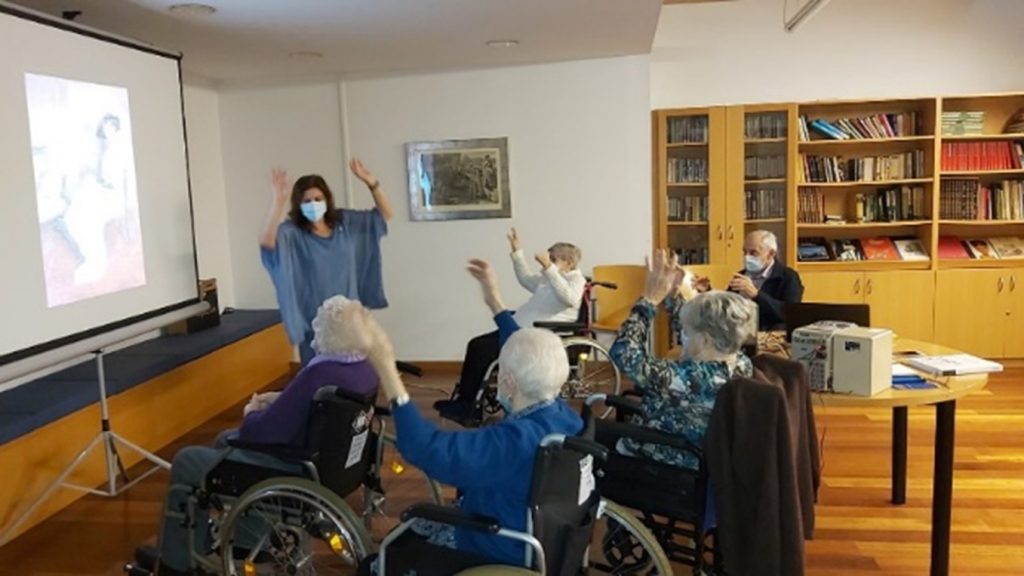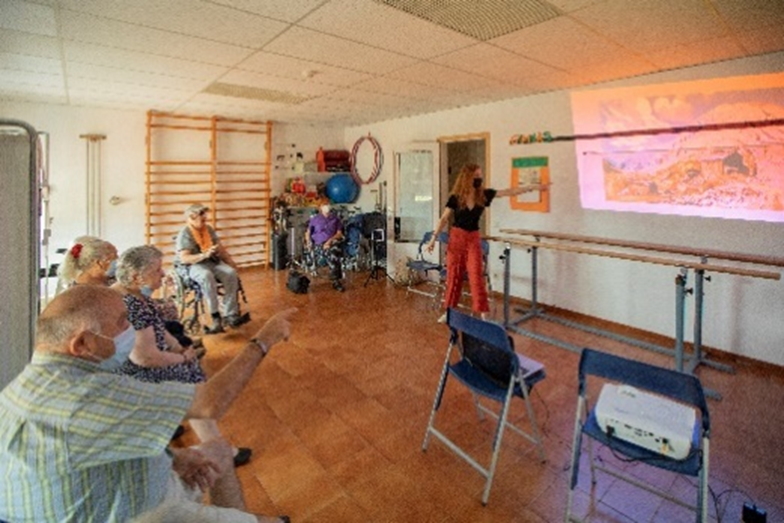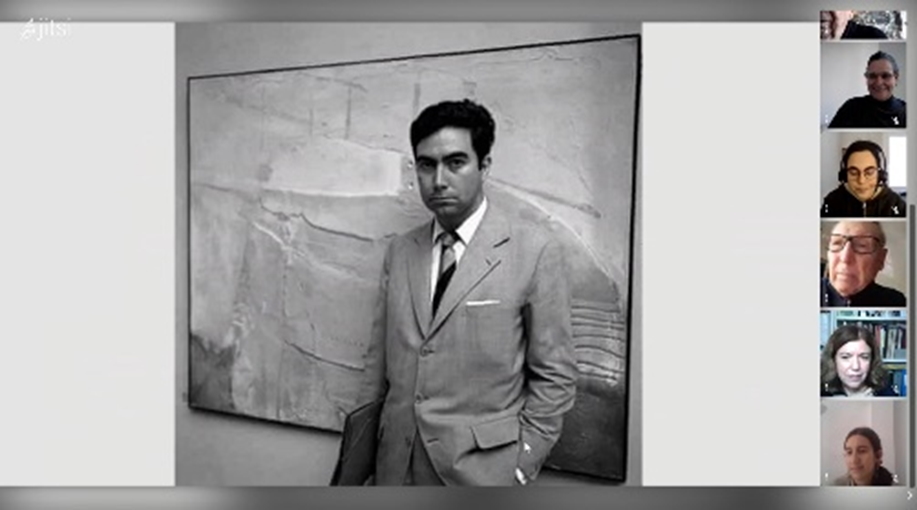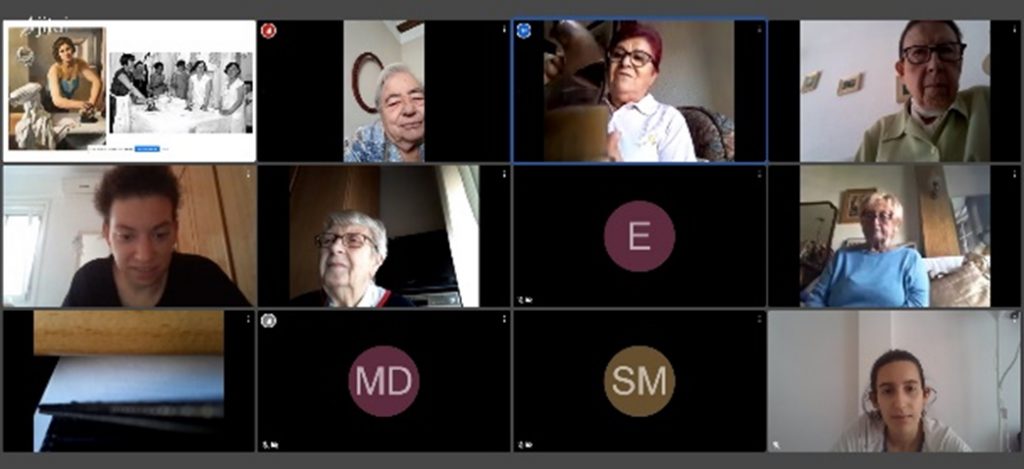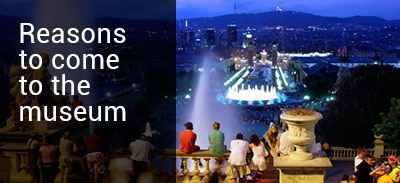Teresa González
After a year and a half since the beginning of the Pandemic (March 2020), we can tell you what we have done from the museum for the most vulnerable people and the ones who have experienced situations of isolation and disconnection from their surroundings and life.
A pending project due to the pandemic
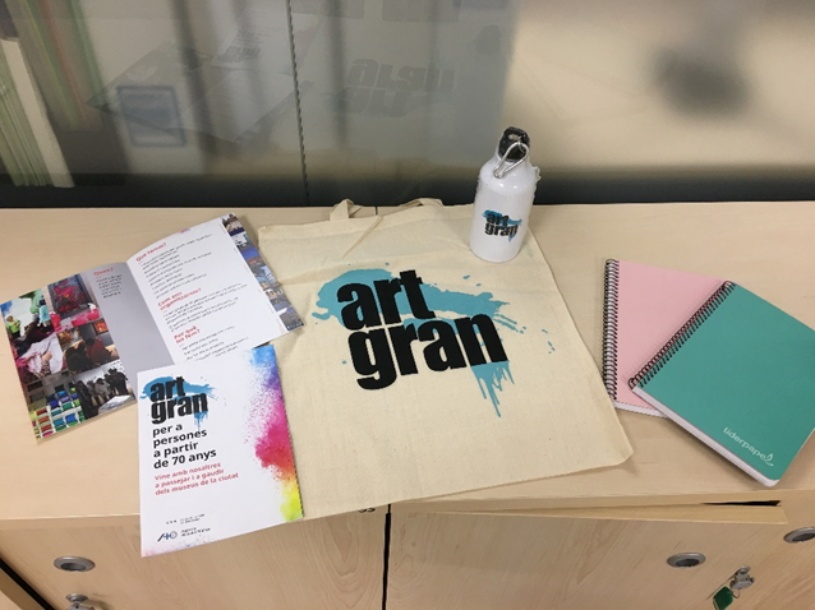
Material created by the Barcelona Public Health Agency for the project Art Gran
But first we have to look back and contextualise all the work that we have been carrying out during this time and that didn’t not start from scratch. At the end of 2018, the Barcelona Public Health Agency and, more specifically, the Service of Evaluation and Methods of Intervention, in the form of Rosa Puigpinós, contacted a series of museums and cultural centres (Museu Picasso, CCCB , CaixaForum, Modernista Complex of Sant Pau and the Museu Nacional) to propose us to be part of a research and intervention group that makes it clear how the arts can be a good tool for empowerment, to work for active ageing and to combat unwanted loneliness among the elderly. Throughout the year the participating members of the group drew up an Action Protocol, Art Gran, which includes a series of proposals for intervention that the people chosen from 3 districts of Barcelona (Horta-Guinardó, Gràcia and Nou Barris) would carry out in each of the entities from March 2020 onwards, just before the outbreak of the pandemic. The project would remain in suspense, but currently and, with the improvement of the health situation, the Barcelona Public Health Agency has contacted us again to resume the project that we will surely start in the spring of 2022.
An emergency call
Already in the middle of the pandemic, Apropa Cultura contacted us and the CCCB and told us that from the Municipal Institute of Social Services, at the end of July 2020, they had been asked to carry out an emergency action in the care homes of Barcelona City Council that would help, mainly, to cheer the people up, to work on cognitive aspects and to maintain the interpersonal relations among the elderly. After a very positive online experience carried out during August 2020 with the music therapist Mònica de Castro, Apropa Cultura proposed to the two institutions to expand the experience based on plastic arts. Each one would make a proposal of intervention with the main goal being to alleviate, as far as possible, the situation of disconnection, isolation and lack of social interaction that affected the emotional state of the elderly in a very worrying way.
Giving reasons for hope
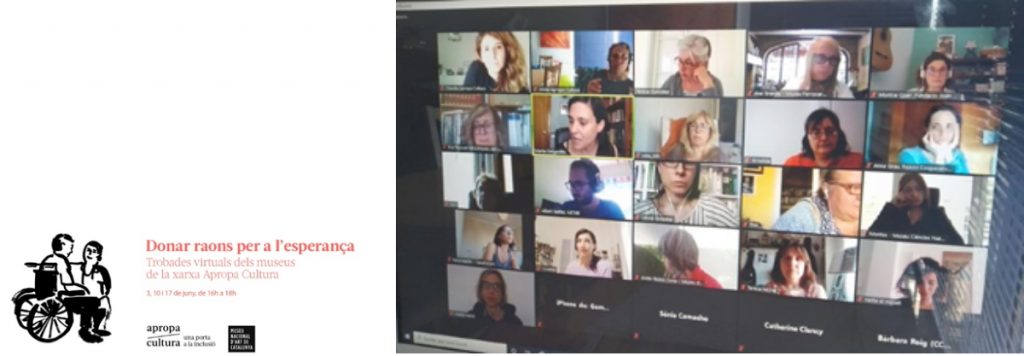
Online conversations between the social sector and the cultural sector
Also during the pandemic, the museum took part in talks with social organisations, Giving reasons for hope, which sought to take the pulse of how the health emergency situation was being experienced among the most vulnerable people and to ask how cultural facilities could help make that situation more bearable. From among many of the issues discussed during the meetings, and at the request of some representatives from the care homes for the elderly, the possibility was raised that heritage organisations could move to the centres for the elderly to carry out the cultural activity in the care homes themselves. From this demand, coinciding with the one made at the time by Barcelona City Council, arose the initiative, coordinated by Apropa Cultura, El museu s’Apropa (The museum gets close).
The museum moves to the Care Homes
Gemma Reguant in the care home Fort Pienc Mónica Perez (Fragment) in the care home l’Onada
Based on this idea, the museum prepared two activities that began in person in mid-October 2020 in the 4 care homes for the elderly of Barcelona City Council (Fort Pienc, Layret, L’Onada and Josep Miracle). The two activities that were prepared were Breathing Pictures and Shared Stories.
Breathing paintings consisted of 4 sessions spread over the last quarter of 2020. Accompanied by Gemma Reguant, an expert in voice and breathing and, based on a selection of works from the museum, it was proposed to awaken full consciousness and sensory memory of the participants with the fundamental aim of providing them with health and well-being benefits. The programme of the sessions had as the strengths to be achieved:
- Cheer them up and increase their emotional well-being.
- Awaken their sensory capacity and reduce stress.
- Enhance calm through breathing.
- Develop curiosity and memory through the attentive gaze.
All the sessions were monitored and evaluated and can be consulted in the museum’s Accessibility Department.
Shared stories. From January to July 2021 a new proposal was developed which on this occasion was also implemented in the care homes by two mediators of the museum, experts in working with the elderly. The proposal consisted of the development of 4 sessions per care home, each of which put forward a different topic of conversation. Based on a selection of works from the museum, stories were shared among the participants about topics that could be of interest to them: the museum and the neighbourhood, trades and work, leisure time, etc.
This new proposal used methodologies and strategies for cognitive and sensory activation that posed creative questions that stimulated a dialogue that facilitated positive thinking. Beyond working based on memories, the aim of this conversation was to encourage the development of the imagination using images, objects, words, music and sounds, gestures and movement.
We enter in the homes and centres for the elderly
Online sessions of the Fundació Tàpies and the Museu Nacional through the network of Vincles BCN and Casals de la Gent Gran of Barcelona City Council
At the same time that activities were being carried out in care homes, the Museums and Accessibility working group, of which the museum forms part, was also set up to offer a programme of activities for elderly people through the Xarxa Vincles BCN and the Casals de Gent Gran. This time, in addition to the Museu Nacional, this included the participation of the Railway Museum of Catalonia, the Palau Güell, the Maritime Museum of Barcelona, the Sant Pau Modernist Precinct, the Tàpies Foundation, the Miró Foundation, the Local Museum Network, the Episcopal Museum of Vic, the Museum of Natural Sciences of Barcelona, the Museums of Esplugues de Llobregat and the Royal Monastery of Santa Maria de Pedralbes.
At the same time that activities were being carried out in care homes, the Museums and Accessibility working group, of which the museum forms part, was also set up to offer a programme of activities for elderly people through the Xarxa Vincles BCN and the Casals de Gent Gran. This time, in addition to the Museu Nacional, this included the participation of the Railway Museum of Catalonia, the Palau Güell, the Maritime Museum of Barcelona, the Sant Pau Modernist Precinct, the Tàpies Foundation, the Miró Foundation, the Local Museum Network, the Episcopal Museum of Vic, the Museum of Natural Sciences of Barcelona, the Museums of Esplugues de Llobregat and the Royal Monastery of Santa Maria de Pedralbes.
We all offered a series of very diverse activities in which users of the network Vincles could participate from home using a tablet provided by Barcelona City Council. The sessions were held every Wednesday from 11 a.m. to noon, from 3rd March to 9th June, 2021. The programme demonstrated that networking between cultural institutions and the administration, and the use of technologies facilitates the connection and the interrelation between people, as included in the valuation carried out by both the coordinator of Vincles: “The cycle has aroused interest in culture, many of whom had never done cultural activities. They also stated that they were happy because the activity served to have a good time in these difficult times of the pandemic and they have met new people, with whom they are now talking and are establishing new links.”, and the representative of the Promotion of the Elderly of Barcelona City Council, who stated, “that the Vincles service works on loneliness. Not just living alone but feeling alone. That is why this activity has been so positive, it has a very important emotional impact, as it allows them to feel accompanied, meet other people and learn from culture”.
132 people registered in the programme and finally 96 participated.
Finally we can go out
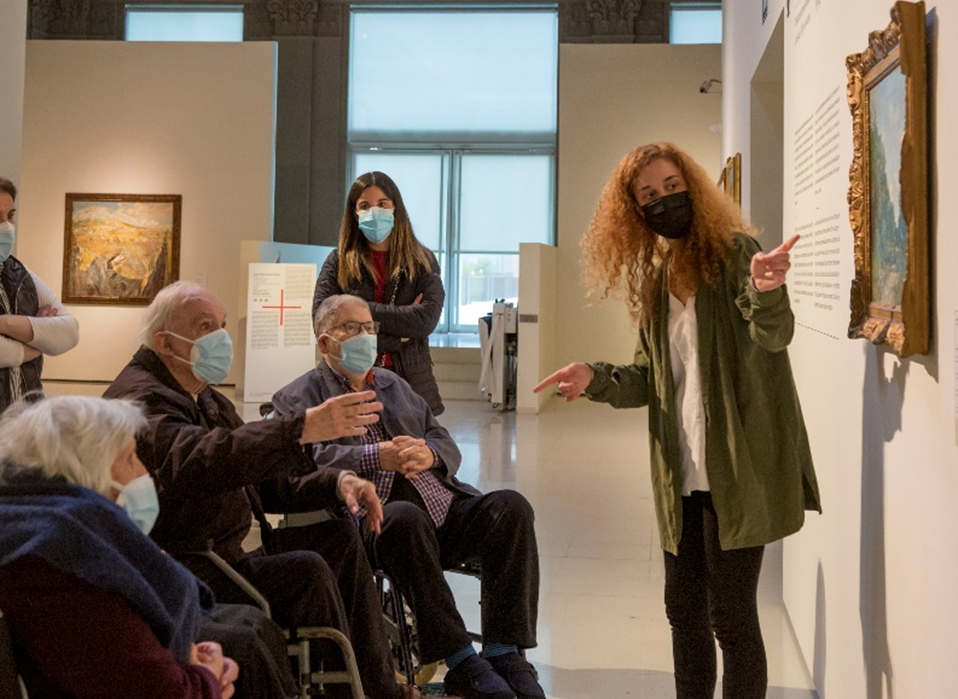
Visit of the Josep Miracle Care Homes on the International Museums Day
With all this, the health situation improved and the restrictive measures were eased in the care homes, which provided a chance for a day out for the elderly to enjoy a special day while participating in activities in museums and cultural centres. Taking advantage of the opportunity, the Museum Service of the Generalitat de Catalunya proposed for the International Museums Day (18th May) the initiative Let’s welcome the elderly, which encouraged museums to invite a day centres and/or care homes for elderly people to participate in person in an activity. In our case we invited the 4 municipal care homes and it was the Josep Miracle care home that decided to pay us a visit. The face of surprise in front of the work of one of the users I think says it all, it was a day of celebration of life.
What does the future hold?
After more than a year of pandemic we have come face to face with one of the most vulnerable groups of people and has reaffirmed what many of us guessed or knew, that art and culture can become a first-order health asset. As it is already being developed in many countries, programmes dedicated to the Health and Welfare of people are increasingly present, also in Catalonia. The work being carried out by the Commission of Museum and Health is a paradigmatic example, led by the Service of Museums and Protection of Property of the Department of Culture and which includes some museums of the Network of Art Museums, the Museum of Immigration, the Office of Cultural Heritage of the Barcelona Provincial Council, the Catalan Public Health Agency, the Barcelona Public Health Agency, Apropa Cultura, and the Arts in Health International Foundation.
And as evidenced by this Commission, or the Working Group of Museums and Accessibility or the network made up of cultural entities and social entities Apropa Cultura, the future lies above all in networking, which allows experiences to be shared, learning from all areas – cultural, health, and social. The future should also include the involvement of universities and the Public Administration (whichever of them), with the support of private initiatives and for cultural institutions to incorporate health and welfare programmes into their strategic plans, in order to ultimately leave out personalisms and work together for health and the common good.
Departament d’Accessibilitat i Inclusió

